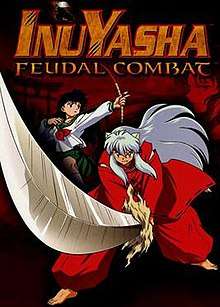Inuyasha: Feudal Combat
Inuyasha: Feudal Combat (犬夜叉 奥義乱舞, Inuyasha: Ōgi-Ranbu) is a 3D computer graphics fighting game for the PlayStation 2 based on the Inuyasha manga and anime series.
| Inuyasha: Feudal Combat | |
|---|---|
 | |
| Developer(s) | Eighting/Raizing |
| Publisher(s) | Bandai |
| Platform(s) | PlayStation 2 |
| Release | |
| Genre(s) | 3D weapon based versus fighting |
| Mode(s) | Single player multiplayer |
Bandai planned to release this video game on August 16, 2005 in North America, but it was postponed to August 24 due to the Miyagi earthquake. It was released in Japan on June 16, 2005.
Bandai also planned to release this game on Nintendo DS and Sony PlayStation Portable but it was cancelled.[1]
Characters
Here is a list of playable characters, characters in italics have to be unlocked throughout story mode.
- Inuyasha
- Kagome Higurashi
- Miroku
- Sango
- Shippo
- Sesshomaru
- Kagura
- Koga
- Kikyo
- Kohaku
- Naraku
- Demon Inuyasha
- Human Inuyasha
- Bankotsu
Gameplay
In Inuyasha: Feudal Combat, up to four characters, two per team, may be present at once in a battle, however, two player characters cannot be on the same team. (IE: Player 1 as main fighter; Player 2 as their partner) Both the player and opponent may each select another character as their partner. There are four modes of gameplay, including Story, Mission, Battle, and Practice modes.
When the Spirit Gauge is full, a special Finishing Move can be performed. Each character's basic Finishing Move can be activated by pressing and holding the circle button. But when a character is fighting alongside a partner and the duo reaches Great affinity, pressing circle will trigger a combined Finishing Move, a combined team attack between the two characters. Certain player/partner combinations will have their own special finishing move together. Those combinations are:
(Remember: The player can be either of the characters, so can the partner)
- Inuyasha/Sesshomaru
- Inuyasha/Kikyo
- Inuyasha/Kagome
- Kikyo/Kagome
- Sango/Miroku
Four different formations (the different ways the player's partner can assist the player) can be selected during the battle: Wind formation (partner mimics the actions of the player), Forest formation (the player and the partner are always targeted on different opponents), Mountain formation (partner stays between the player and opponent and blocks enemy attacks) or Fire formation (both player and partner focus on the same opponent and attack continuously). The Fire and Mountain formations also increase the strength and defense of the player and partner, respectively.
Affinity will have an effect on what the characters say to each other.
- Bad Affinity - Not very good at all.
- Normal Affinity - What they'd normally treat each other.
- Good Affinity - Pretty well.
- Great Affinity - Good enough to pull off the Combined Finishing Move.
Also, some characters will have a certain affinity from the start. For example, Inuyasha and Koga will have a low affinity, however, Inuyasha and Kagome will have a high affinity.
Story mode
In Story Mode, the player must choose to follow first Inuyasha's, then Sango and Miroku, then Sesshomaru's, and finally Shippo's "Chapter". These consist of a series of battles interlaced with cut scenes illustrating a story. If the player is KO'd (knocked out) in one of these battles, a screen with the option to reattempt the last battle is available. If each of these stories is completed without the player getting KO'd even once, then a new character can be selected in "Battle", "Practice", and "Mission" modes as the player/partner. Those characters are:
- Inuyasha's chapter - Naraku
- Sango/Miroku's Chapter - Bankotsu
- Shippo's Chapter - Human Inuyasha
- Sesshomaru's Chapter - Demon Inuyasha
Reception
| Reception | ||||||||||||||||||||||||
|---|---|---|---|---|---|---|---|---|---|---|---|---|---|---|---|---|---|---|---|---|---|---|---|---|
| ||||||||||||||||||||||||
The game received "mixed" reviews according to video game review aggregator Metacritic.[2]
References
- "Inuyasha: Feudal Combat for Nintendo DS". ToTheGame. Archived from the original on January 11, 2008. Retrieved December 29, 2015.
- "Inuyasha: Feudal Combat for PlayStation 2 Reviews". Metacritic. Retrieved December 29, 2015.
- Davis, Ryan (September 20, 2005). "Inuyasha: Feudal Combat Review". GameSpot. Retrieved December 29, 2015.
- Scantleberry, Chris (September 6, 2005). "GameSpy: Inuyasha: Feudal Combat". GameSpy. Retrieved December 29, 2015.
- Knutson, Michael (September 11, 2005). "Inuyasha: Feudal Combat - PS2 - Review". GameZone. Archived from the original on October 4, 2008. Retrieved December 29, 2015.
- Sulic, Ivan (August 30, 2005). "InuYasha: Feudal Combat". IGN. Retrieved December 29, 2015.
- "Inuyasha: Feudal Combat". Official U.S. PlayStation Magazine: 107. October 2005.
- "Review: Inuyasha: Feudal Combat". PSM: 82. November 2005.
- Sewart, Greg (September 13, 2005). "InuYasha: Feudal Combat Review". X-Play. Archived from the original on December 10, 2005. Retrieved December 29, 2015.